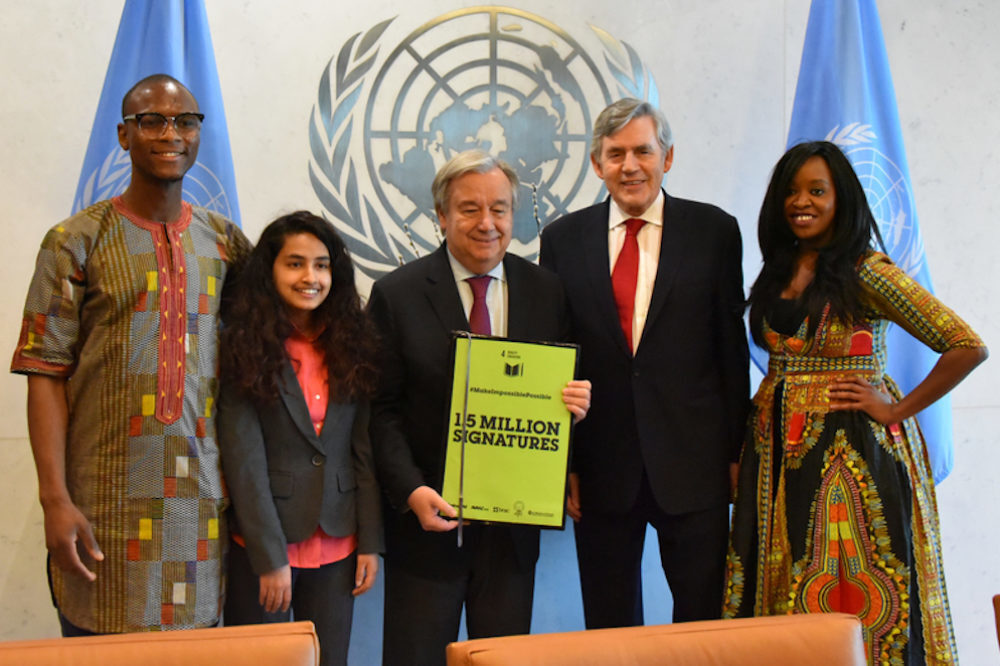More than 100 leaders call on UN summit to commit to financial resources to tackle “global education in crisis”

Signatories call on UN summit to commit to bold measures and deliver “the first generation in history where every child goes to school”.
- Leaders and former leaders warn the education crisis has been made worse by financial pressures from the Covid-19 pandemic, and now the food, energy, debt and currency crises.
- Call for Heads of State attending historic UN Transforming Education Summit in September to agree a new finance plan as education is losing in the competition for limited resources.
- Signatories call on UN summit to commit to bold measures and deliver “the first generation in history where every child goes to school”.
More than 100 leaders and former world leaders have signed an open letter calling for urgent financial action to tackle the global education crisis days ahead of the historic Transforming Education Summit at the United Nations in New York from the 16-19th September.
It calls on world leaders attending the summit to commit to a bold finance action plan that can transform the lives of millions of children and young people around the world.
It says: “Global education is in crisis. Today nearly 300 million children don’t go to school, more than 80% of whom are found in low-income countries, and 800 million young people will leave school without any qualifications.
“Countries across the globe have had to cope with the financial pressures of the Covid-19 pandemic, now compounded by the food, energy, debt and currency crises triggered and exacerbated by the war in Ukraine, making education compete for the limited resources governments have available.”
Signatories of the letter include Helen Clark – Prime Minister of New Zealand (1999-2008); UNDP Administrator (2009-2017), Fernando Henrique Cardoso – President of Brazil (1995-2003), HE Joyce Banda – President of Malawi (2012-2014), Chair of Human Capital Africa, Lakhdar Brahimi – Minister of Foreign Affairs of the Republic of Algeria (1991-1993); Gordon Brown – Prime Minister of the United Kingdom (2007 – 2010) UN & Arab League Envoy to Syria (2012-2014); Member of The Elders, Ban Ki-moon – UN Secretary General (2007-2016); Deputy Chair of The Elders, Javier Solana – Secretary General of the Council of the EU (1999-2009); Secretary General of NATO (1995-1999), Chief Olusegun Obasanjo – President of the Federal Republic of Nigeria (1999-2007).
Cutting education spending is particularly damaging, the letter argues, given the overwhelming evidence that an educated and skilled workforce is central to escaping poverty, eliminating the gender and wealth disparities that continue to plague our societies, and to achieving economic recovery and growth.
It says that the economic cost of not investing in education will be disproportionately borne by low- and middle-income countries and this generation of their students, intensifying the existing serious inequality between generations and countries.
It says: “Without addressing the persistent exclusion of minorities, migrants, refugees and other marginalised groups in our education systems, the entrenchment of existing inequalities within societies will only grow deeper and we will fail to achieve inclusive, peaceful and sustained development.”
The letter focuses on financing education and says that “modernisation of education systems through better training and rewards for teachers, the application of new technologies and digital learning and new pathways for skills training will make an important difference on the outcomes we are able to achieve – but so will money.”
It says: “We are so far away from our goal of universal education by 2030 that unless we act quickly and generously, we will fall further behind on our Sustainable Development Goal 4 commitment to ‘ensure inclusive and equitable quality education and promote lifelong learning opportunities for all.’”
The letter comes as a youth-led campaign calling on world leaders to invest in children’s education continues to gain momentum around the world.
Ahead of the summit, the #LetMeLearn campaign has seen young people from over 100 countries post videos on social media demanding that world leaders listen to the voices and experiences of young people. The campaign has been backed by high-profile celebrities including Stephen Fry, Priyanka Chopra and actor Bill Nighy.
The signatories of today’s letter propose “a compact for Global Education between developing countries and the developed economies that provide donor aid” which includes:
- Developing countries to raise their education budgets to 15-20% of their public spending and 4-6% of their income; supported by an increase in sustainable funding for education through domestic action to reform national tax systems, coupled with international action to cut tax loopholes and illicit financial flow.
- Multilateral development banks to raise International Development Assistance from 10% to 15% to education, unlocking an additional $15 billion over the next five years for 200 million children.
- Donor governments and banks to launch the proposed International Finance Facility for Education – endorsed by the UN Secretary-General – and deliver an extra $15 billion in resources by 2030 for the 700 million children in middle-income countries not receiving a quality education.
- Development Assistance Committee (DAC) donors commit to higher Official Development Assistance (ODA) levels, with a greater amount of the latter channeled through international and multilateral institutions, including UNESCO, UNICEF and other UN Agencies, and through educational initiatives such as the Global Partnership for Education and Education Cannot Wait.
To read the full letter click here.
Notes to Editors
For further information:
Nicole Martin
Email: [email protected]
Mob: +44 7768 695 087